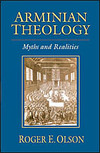 Some great stuff from Roger Olson's new book Arminian Theology: Myths and Realities (ChristianBook.com link \ Amazon.com link):
Some great stuff from Roger Olson's new book Arminian Theology: Myths and Realities (ChristianBook.com link \ Amazon.com link):>> "The point here is that both sides (and perhaps all significant theological systems) involve mystery, and in making their theological systems perfectly intelligible, mystery is a problem. Ironically, both sides tend to point out the other's weakness in appealing to mystery without acknowledging their own..." (p. 72)
>> "Thus it appears that people are not Calvinists or Arminians because one side has proven itself right, but because these people can find one set of mysteries (or problems) easier to live with than the other." (p. 72)
>> "So what is the solution? Why be either a Calvinist or an Arminian? At rock bottom some Christians are Calvinists because when they read Scripture (or perhaps examine their own experience) they see God as almighty, supremely glorious, absolutely sovereign and the all-determining reality. This is their 'blik,' the synthetic vision that guides the hermeneutics of individual passages." (p. 72)
>> "Of course, both sides recognize some truth in the other perspective, Calvinists acknowledge God as loving and merciful (especially toward the elect), and Arminians acknowledge God as almighty and sovereign. Both believe that God is supremely great and good. But one side starts with God's goodness and conditions God's greatness in that light. Each has its 'blik' which largely determines how it interprets Scripture." (p. 73)
>> "Contrary to popular belief, then, the true divide at the heart of the Calvinist-Arminian splits is not predestination verses free will but the guiding picture of God: he is primarily viewed as either (1) majestic, powerful, and controlling or (2) loving, good, and merciful. Once the picture (blik) is established, seemingly contrary aspects fade into the background, are set aside as 'obscure' or are artificially made to fit the system. Neither side absolutely denies the truth of the other's perspective, but each one qualifies the attributes of God that are preeminent in the other's perspective. God's goodness is qualified by his greatness in Calvinism, and God's greatness is qualified by his goodness in Arminianism." (p. 73)
1 comment:
"God's goodness is qualified by his greatness in Calvinism, and God's greatness is qualified by his goodness in Arminianism." This is why I am so encouraged by the recent interest in Trinitarian theology. It is the only way we can get a balanced understanding of who God is.
Brad, have you ever read Tolkien's short story, "Leaf by Niggle?" Among other thing, it gives an intriguing picture of the sort of conversations that might transpire between the Father and the Son, where Greatness and Goodness meet.
Post a Comment